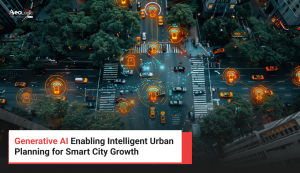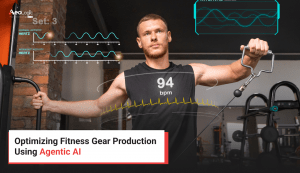Undoubtedly, Artificial Intelligence has taken over 2020 by a storm. The pandemic is a practical use case of how disruptive technologies like Big Data, Artificial Intelligence, IoT, Blockchain and Machine Learning can actually be used against the diagnosis and control of viral infections. AI being the most decisive technology amongst the other tech is seeing widespread adoption in the healthcare industry already, like–thermal scanning, early detection of infections, and contact tracing.
Since AI is the lead of the transformational force in healthcare, it becomes a need to discuss the impact of AI-driven tools on a long term basis. Stay with us through this article-
Next Generation of Radiology tools
So far, the radiological images obtained by CT Scanners, MRI Machines, and X rays have offered non-invasive visibility into the deeper and internal networks of the human body. And thus, diagnosis cannot be made immediately, which is why doctors have to rely on tissue sampling in order to diagnose the disease. But this can be solved with the help of AI as the next generation of radiology tools are supposed to be capable enough to conduct virtual biopsies. This alone will be a huge incentive in the whole radiology sector.
Machine Learning and Virtual Reality will bring theoretical learning into virtual reality–Every year nearly millions of dollars are spent on medical training, which has its own sets of risks. With the assistance of Machine Learning, medical training can be done in a real-time virtual environment through VR sets. This will help several surgeons and medical trainees to practice their training in a life-like scenario which will not only save money but will also promote surgical success rate.
VR for treating PTSD patients and depression patients– VR headsets so far are mainly used for gaming purposes only, but the benefits of this technology lie far better in the healthcare industry. Especially in treating PTSD patients, cancer patients and other mental illness as well. VR can help detect and curb anhedonia, which is an early symptom of depression. With this unconventional scenario, VR headsets can provoke positive feelings in patients and target negative symptoms like anxiety, hopelessness and sadness.
AI can create a more accurate analysis for pathology images–It is said that around 70% of all healthcare decisions are done on the basis of a pathology report. This means, that Pathologists are critical in any diagnosis as their acquired data helps providers in creating a spectrum of care delivery. With the assistance of AI, analytics can be done even at the pixel level and detail larger images for doctors that were earlier unrecognizable to the human eye (best for cancer patients).
“We’re now getting to the point where we can do a better job of assessing whether cancer is going to progress rapidly or slowly and how that might change how patients will be treated based on an algorithm rather than clinical staging or the histopathologic grade, and this is a huge advantage”. Golden–Doctor and Professor of pathology at HMS-USA.
Final Words
The real-time applications of AI is huge as the umbrella technologies of the tech like VR or Virtual Reality, AR or Augmented Reality, ML or Machine Learning, or RPA or Robotic Process Automation has their own set of advantages to offer. These technologies can be combined together and applied in critical sectors like healthcare and defence. The outcomes of all these AI umbrella technologies and AI alone is outstanding as the governments can save millions of dollars that are annually spent on manpower for ensuring the accuracy of earlier curated data.
AeoLogic works with the Government of India and supports them with both research and implementation of digitally transformational technologies like AI, Blockchain, Big Data, IoT and more. Connect with us for a quick consultation.

Manoj Kumar is a seasoned Digital Marketing Manager and passionate Tech Blogger with deep expertise in SEO, AI trends, and emerging digital technologies. He writes about innovative solutions that drive growth and transformation across industry.
Featured on – YOURSTORY | TECHSLING | ELEARNINGINDUSTRY | DATASCIENCECENTRAL | TIMESOFINDIA | MEDIUM | DATAFLOQ









